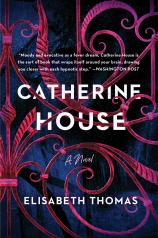Catherine House
Review
Catherine House
When Ines Murillo is accepted to the illustrious and mysterious Catherine House for college, she believes it is despite her recent troubled past. In her three strange years cloistered at the prestigious school, she learns that her acceptance was, in actuality, because of her troubled past. She and all of her classmates had been carefully selected based not on grades or accomplishments, but on traits such as creativity, loyalty and desperation. But just what kind of loyalty does Catherine House demand from its desperate students? Ines comes to understand only a few of the tightly kept secrets of the cult-like institution in Elisabeth Thomas’ atmospheric debut novel.
Catherine House has produced some of the most powerful figures --- politicians and presidents, artists and scientists --- in recent decades. But the school demands a lot from its students for the three years they are enrolled. They live on the enclosed and secluded Pennsylvania campus with no television, popular music, news or contact with the outside world. They are dressed identically and are asked to leave their pasts behind them. Their classes range from the expected to the esoteric, and the focus of the school is plasm research: a material that Catherine House believes to be the original and essential stuff of the universe.
"This is an eerie tale with most questions left unanswered.... The writing and setting are compelling, and the emotions swing between visceral and dulled in this curious coming-of-age story."
Ines arrives there with the idea that plasm is a hoax, but the school offers her sanctuary from the violent and dangerous life she had been living. Still, even her first night on campus is an alcohol-fueled haze as she continues her habit of self-medicating with drinking and sex. Catherine House students, she learns, are kept fed on a rich five-meal-a-day diet, and the booze flows freely. And, as she peers closer, the darkness under the surface becomes more apparent. The buildings themselves are run down and shoddy, while the plasm labs are state of the art --- symbols of the disregard for students’ well-being relative to the plasm research. It is clear to Ines, just a few months into year one, that Catherine House is experimenting on its students.
The plasm experiments are both physical and emotional. There are wires strapped to bodies that create surreal out-of-body experiences, and there are chanting sessions meant to emotionally root students to Catherine House. These are led mostly by the odd and severe school director, Viktória Varga, but sometimes by M. Neptune, the head of plasm labs. Noncompliance means being sent to the Tower for days, even weeks, of isolation. And some students, like Ines’ roommate Baby, never return.
Ines learns more about the research at Catherine House over her three dreamy and drunken years there, but with each bit of knowledge gained, she risks the friendships she has built and her place in the community. When Viktória announces that she would like Ines to stay on for another three years, it seems more like a threat than an invitation. Ines must make some difficult choices about who she is and who she wants to be, as well as owning up to the girl she once was.
CATHERINE HOUSE is such an unusual book. The device of special school as a place of both revelation and terror is nothing new. Thomas’ prose is pensive and moody, embodied by Ines herself. This is an eerie tale with most questions left unanswered. Ines and readers learn enough to be worried and afraid, but are lulled by the decaying richness and sumptuous yet controlled comforts of Catherine House. Thomas does such interesting work as the fictional place and her writing style share so much: gorgeous details masking dread, uncertainty and awe.
What exactly is CATHERINE HOUSE about? It is hard to say. Thomas is examining pain and depression, fear and loneliness, the siren song of success and discovery. But she gives very little to her characters, and thus to her readers, by way of answers. Instead, we, like Ines, are dropped into the middle of a nightmarish three-year journey that may lead to realization, to something quite terrible indeed, or, honestly, to nowhere in particular. The writing and setting are compelling, and the emotions swing between visceral and dulled in this curious coming-of-age story.
Reviewed by Sarah Rachel Egelman on May 15, 2020




